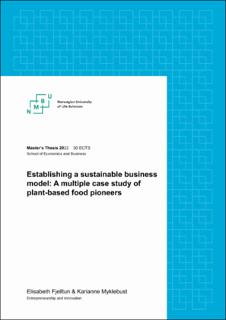| dc.contributor.advisor | Kubberød, Elin | |
| dc.contributor.advisor | Carraresi, Laura | |
| dc.contributor.author | Myklebust, Karianne | |
| dc.contributor.author | Fjelltun, Elisabeth | |
| dc.date.accessioned | 2022-11-01T12:29:25Z | |
| dc.date.available | 2022-11-01T12:29:25Z | |
| dc.date.issued | 2022 | |
| dc.identifier.uri | https://hdl.handle.net/11250/3029339 | |
| dc.description.abstract | Background: Organizations are calling for a sustainable transition within the agri-food sector due to emissions associated with traditional food production. As a result, plant-based alternatives are becoming more prevalent in the market, both nationally and internationally. This recent trend and consumers becoming more interested in plant-based alternatives have led to the emergence of more plant-based firms and product lines.
Purpose: This study investigates how pioneers in the plant-based agri-food sector work to redesign their business model toward sustainability. Sustainable business models are an essential tool that can help contribute to the sustainability transition since it encourages firms to create environmental, social, and economic value in new ways. In recent years, research has been conducted about sustainable business models. On the other hand, there is a lack of research on how sustainability is incorporated within firms’ business models and how this can be done in practice through a redesign process. Our study addresses this knowledge gap by answering the following problem statement: “How do firms within the plant-based sector work to establish a sustainable business model?”
Research methodology: We used a multiple case study design to answer the problem statement. The selection consists of micro-enterprises and SMEs within the plant-based agri-food sector. The unit of analysis is the firms’ founders or managers. The data was collected through semi-structured in-depth interviews and further analyzed using the thematic analysis approach proposed by Braun and Clarke.
Results and implications: The study found a need for new knowledge on making plant-based food alternatives. The resources available within the plant-based sector were scarce, thus, making plant-based food production complex. The results from the study found that economic survivability was prioritized over social and environmental value creation within the firms. In addition, previous research indicates that the research field of sustainable business models is fragmented. Thus, the study results found that it was challenging to categorize the sustainable business models of the plant-based firms according to the archetypes proposed by Bocken. Therefore, we have further developed the framework by creating a new archetype we believe is more suitable for firms within the plant-based agri-food sector. | en_US |
| dc.description.abstract | Bakgrunn: Flere organisasjoner etterlyser et bærekraftig skifte i matsektoren på bakgrunn av utslipp forbundet med matproduksjon. Et skifte mot flere plantebaserte matalternativer har gjort sitt inntog på markedet de siste årene, både i nasjonal og internasjonal sammenheng. Dette har forårsaket nye konsumenttrender og dermed ført til et utspring av flere plantebaserte bedrifter og produktlinjer på markedet.
Hensikt: Hensikten med denne studien er å undersøke hvordan pionerer i den plantebaserte matsektoren jobber for å skape et skifte i etablerte praksiser mot bærekraft. Bærekraftige forretningsmodeller er nevnt som et viktig verktøy i den bærekraftige omstillingen som fører til at bedrifter må praktisere på nye måter for å skape økonomisk, miljømessig og sosial verdi. I nyere tid har det blitt fremlagt mye forskning om bærekraftige forretningsmodeller. Derimot har det vært lite fokus på hvordan bærekraft innlemmes i forretningsmodellen, og hvordan dette gjøres i praksis gjennom redesign. For å dekke dette kunnskapshullet i eksisterende forskning, vil vi besvare følgende problemstilling: "Hvordan jobber bedrifter i den plantebaserte matsektoren for å etablere en bærekraftig forretningsmodell?"
Metode: For å besvare problemstillingen har vi benyttet en flercase-studie som metodisk design. Utvalget består av mikrobedrifter og SMB i den plantebaserte matsektoren, hvor analyseenheten er gründer eller daglig leder. Vårt empiriske datagrunnlag ble samlet inn gjennom semistrukturerte dybdeintervjuer, og analysen ble gjennomført etter Braun og Clarkes fremgangsmåte for tematisk analyse.
Funn og implikasjoner: Studiens funn viser et stort behov for ny kunnskap for å lage plantebaserte matprodukter, samtidig er ressursene for å tilegne seg dette en mangelvare i den plantebaserte matsektoren. Våre funn tendenserer mot at økonomisk levedyktighet prioriteres over den sosiale og miljømessige dimensjonen i deres verdiskaping. Tidligere forskning om bærekraftige forretningsmodeller viser seg å være fragmentert. Våre funn viser at en bærekraftig forretningsmodell i den plantebaserte sektoren ble vanskelig å kategorisere etter Bockens arketyper for bærekraftige forretningsmodeller. Vi har derfor videreutviklet rammeverket med en ny arketype som vi mener passer for den plantebaserte matsektoren. | en_US |
| dc.language.iso | eng | en_US |
| dc.publisher | Norwegian University of Life Sciences, Ås | en_US |
| dc.rights | Attribution-NonCommercial-NoDerivatives 4.0 Internasjonal | * |
| dc.rights.uri | http://creativecommons.org/licenses/by-nc-nd/4.0/deed.no | * |
| dc.title | Establishing a sustainable business model : a multiple case study of plant-based food pioneers | en_US |
| dc.type | Master thesis | en_US |
| dc.description.localcode | M-EI | en_US |

